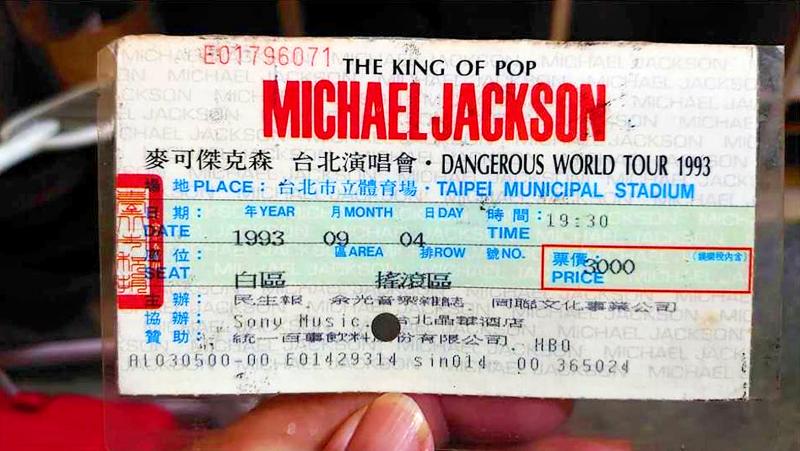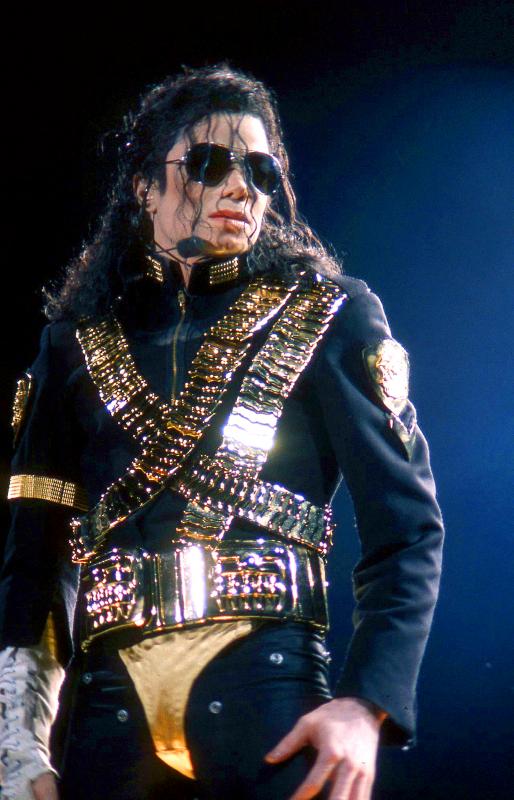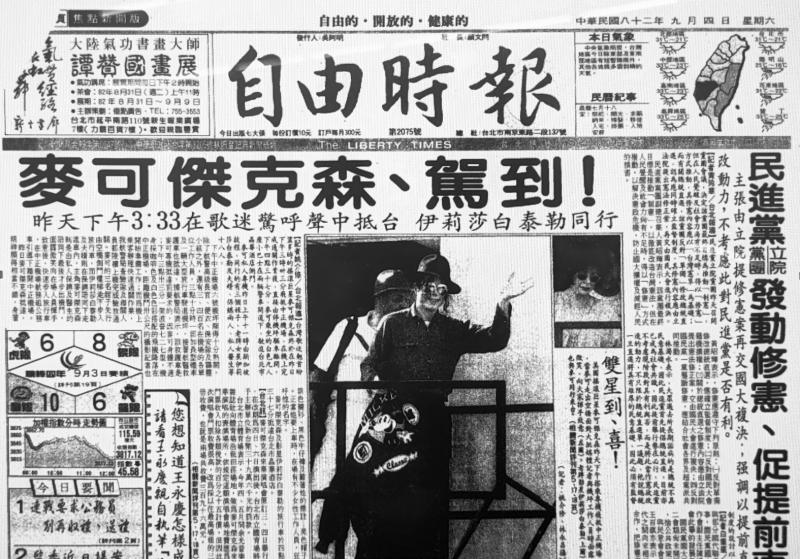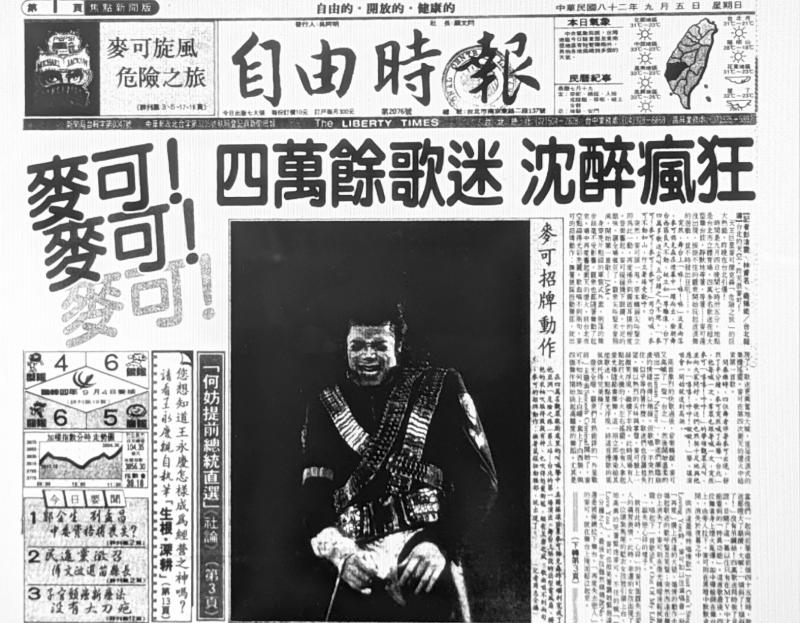Aug. 30 to Sept. 5
Michael Jackson dominated the Liberty Times (Taipei Times’ sister paper) front page for the second day in a row on Sept. 5, 1993, the photo showing him grabbing the crotch of his gold leotards at Taipei Municipal Stadium.
“Michael! Michael! Michael!” the headline screamed, while the caption explained that his penchant for touching his private area is his “signature move.”

Taipei Times file photo
The late superstar was pretty much all the news during his whirlwind first visit to Taiwan for his Dangerous World Tour. Fans lost their minds when he waved at them from his 19th floor window at the Regent Taipei, and reporters relentlessly chased him across town in a game of cat-and-mouse. That day’s Liberty Times devoted four full pages to Jackson’s visit, and several other papers did the same.
There were criticisms against the overzealous atmosphere, the seemingly disproportionate use of police force to maintain order as well as the allegations of child molestation that had just gone public. But Jackson’s star power was out of this world as fans risked their lives just to get a glimpse or a handshake. The Minsheng Daily (民生報) even ran a step-by-step guide to raise one’s chances of interacting with the pop legend.
Things eventually went awry as Jackson’s bodyguards scuffled with the media in front of Toys “R” Us in Taipei, where the star had just spent an hour shopping. A television reporter and fan both suffered injuries, and this incident propelled Jackson onto the Liberty Times front page for the third straight day.

Photo courtesy of Wikimedia Commons
After putting on two spectacular shows, Jackson departed on Sept. 7 to a crazy sendoff. He would return again in October 1996 for his next tour.
MEDIA WAR
According to the United Daily News, the media war was officially ignited the night before Jackson’s arrival. Several night-time variety show hosts on the nation’s three channels boasted about their “special access” to the superstar, vowing to provide extensive coverage of his visit with exclusive interviews from the minute he landed.

Photo: Han Cheung, Taipei Times
“Typhoon Yancy has just left — Hurricane Michael is now sweeping across Taiwan,” the headline read.
After several delays, Jackson finally arrived in the afternoon of Sept. 3 along with his close friend Elizabeth Taylor, her husband Larry Fortensky and three of his nephews. They were escorted by police to the Regent, where about 300 rabid fans were already waiting for them. They were forced to get out of the van and walk inside, allowing the shrieking admirers to see them for 10 seconds.
Jackson reemerged just 15 minutes after entering his presidential suite, waving at the fans below from his window. Wearing a top hat and shades, he flashed the peace sign and blew kisses before disappearing into his room. Some of the crowd were in tears. He was unexpectedly not wearing a face mask, later commenting that it was because “Taiwan’s air is so clean.”

Photo: Han Cheung, Taipei Times
Jackson reportedly appeared in the window three more times over the next several hours, one time wrapping himself in the curtain to the laughter of the lingering fans below.
The Taiwan Television (TTV) variety show Grand Slam (強棒出擊) won a round when the crew happened to be at the right hotel entrance when Jackson’s van arrived. The exclusive footage the show captured was broadcast just an hour later with little time for editing.
The next afternoon, Jackson set out for the concert venue in a Cadillac limo flanked by police cars. To the shock of traffic cops, Linsen N Road and Nanjing E Road became essentially a racetrack as media vehicles, Jackson’s crew and the cop cars jostled for position and ran red lights. It took them just 15 minutes to get to the stadium in rush hour.
The show was a smashing success, but 26 fans were hospitalized after fainting.
PREFERENTIAL TREATMENT
Several letters to the editor in the United Daily News blasted the use of public resources for Jackson’s preferential treatment.
The Liberty Times reported that the grand reception Jackson received at the airport is typically reserved for heads of state, prime ministers or special guests invited by the central government, and should not have been given to a commercial performer.
After several legislators argued over the issue, concert organizer Yu Kuang (余光) explained that the 1,200 Taipei police officers were mobilized to protect the citizens and prevent any accidents, and that Jackson has his own security to protect him.
However, then-National Police Agency director-general Chuang Heng-dai (莊亨岱) was not happy with the Taipei Police Department, noting that it was “excessive” to assign 1,200 officers to the concert. Some officers called the task a “nightmare,” telling the press that even though they enjoy Jackson’s music, they didn’t sign up to become his personal bodyguards.
Another bizarre scene took place on Sept. 5, when Jackson was riding a limo to Toys “R” Us on his off day. Fans bolted after his vehicle, while others hopped on their scooters to give chase, dangerously weaving through chaotic traffic. After much maneuvering, two teenage girls managed to get close enough to Jackson’s window to hand him a Taiwanese tugou (土狗) puppy. Jackson took the dog and gave the pair a thank you note, which excited them so much that they almost crashed.
Toys “R” Us cleared its store and pulled down its metal gates so Jackson could shop undisturbed, but a United Daily News photographer ended up on the wrong side. Jackson’s bodyguard reportedly knocked him down and was about to throw him out before he was stopped. As Jackson calmly browsed the goods, fans pounded on the gate and yelled his name whenever they could see him through the gaps.
Chaos erupted again when Jackson left the store flanked by security, and a Chinese Television Service (CTS) reporter traded blows with a bodyguard after the bodyguard tried to grab his camera. A brief brawl erupted as other reporters and fans charged the bodyguard before police intervened.
That night, the Taipei Police Department announced that it was withdrawing its forces allocated to Jackson’s entourage and canceling all special privileges, including escorts and traffic control to the concert venue. The bodyguard later publicly apologized to the CTS reporter.
Jackson became much more open toward the media and fans after the incident and was more willing to pause for photos instead of ducking and covering his face. Despite the controversy, the next day’s show went off without a hitch, with 38 people fainting this time.
Jackson’s staff returned the puppy to the two teenagers since he could not take it with him, and they hopped on their scooter and joined the final pursuit of the superstar all the way to the airport.
Taiwan in Time, a column about Taiwan’s history that is published every Sunday, spotlights important or interesting events around the nation that either have anniversaries this week or are tied to current events.

The primaries for this year’s nine-in-one local elections in November began early in this election cycle, starting last autumn. The local press has been full of tales of intrigue, betrayal, infighting and drama going back to the summer of 2024. This is not widely covered in the English-language press, and the nine-in-one elections are not well understood. The nine-in-one elections refer to the nine levels of local governments that go to the ballot, from the neighborhood and village borough chief level on up to the city mayor and county commissioner level. The main focus is on the 22 special municipality

The People’s Republic of China (PRC) invaded Vietnam in 1979, following a year of increasingly tense relations between the two states. Beijing viewed Vietnam’s close relations with Soviet Russia as a threat. One of the pretexts it used was the alleged mistreatment of the ethnic Chinese in Vietnam. Tension between the ethnic Chinese and governments in Vietnam had been ongoing for decades. The French used to play off the Vietnamese against the Chinese as a divide-and-rule strategy. The Saigon government in 1956 compelled all Vietnam-born Chinese to adopt Vietnamese citizenship. It also banned them from 11 trades they had previously

In the 2010s, the Communist Party of China (CCP) began cracking down on Christian churches. Media reports said at the time that various versions of Protestant Christianity were likely the fastest growing religions in the People’s Republic of China (PRC). The crackdown was part of a campaign that in turn was part of a larger movement to bring religion under party control. For the Protestant churches, “the government’s aim has been to force all churches into the state-controlled organization,” according to a 2023 article in Christianity Today. That piece was centered on Wang Yi (王怡), the fiery, charismatic pastor of the

Hsu Pu-liao (許不了) never lived to see the premiere of his most successful film, The Clown and the Swan (小丑與天鵝, 1985). The movie, which starred Hsu, the “Taiwanese Charlie Chaplin,” outgrossed Jackie Chan’s Heart of Dragon (龍的心), earning NT$9.2 million at the local box office. Forty years after its premiere, the film has become the Taiwan Film and Audiovisual Institute’s (TFAI) 100th restoration. “It is the only one of Hsu’s films whose original negative survived,” says director Kevin Chu (朱延平), one of Taiwan’s most commercially successful